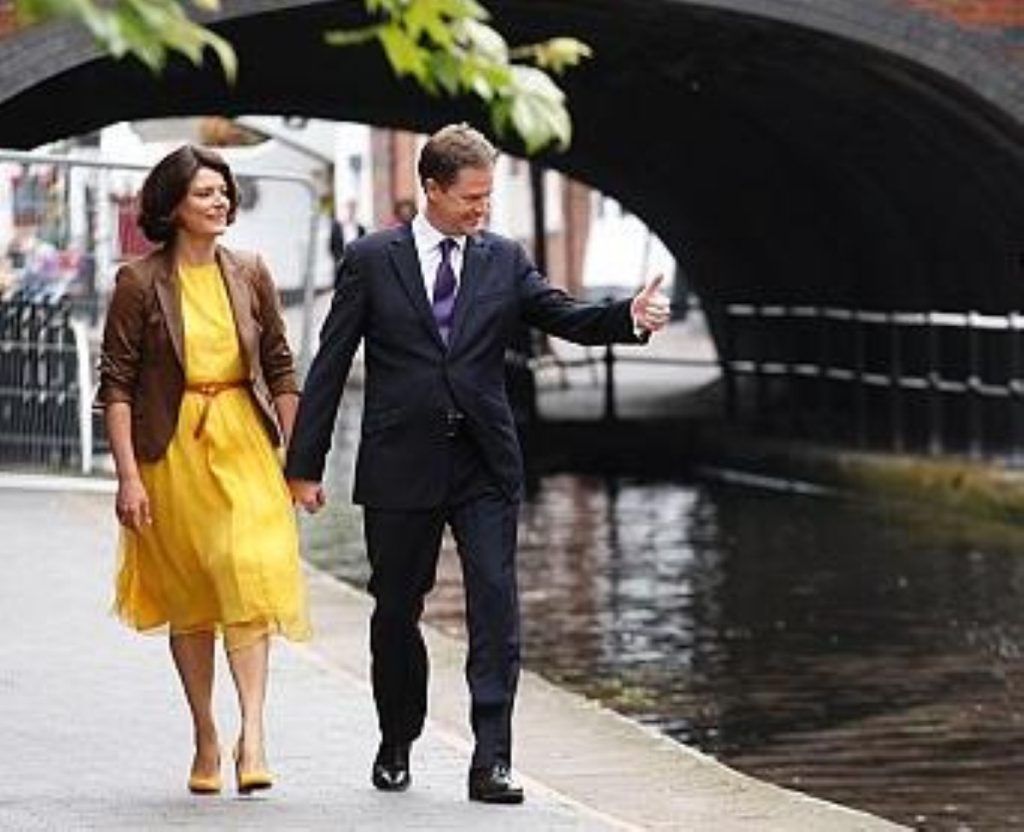Analysis: Resolute Clegg seeks Lib Dem character
Embattled Lib Dems feel they're losing ground because their party identity is being compromised. Nick Clegg's speech addresses both concerns.
By Alex Stevenson in Birmingham Follow @alex__stevenson
On paper, this could be Nick Clegg's best speech yet to his party's conference. It's certainly his most effective.
In a perverse way it's the depth of the mire the Liberal Democrats are in which have made Clegg's message so strong.


The Liberal Democrat leader's speechwriters have clearly identified the problems faced by the party, battered and bruised by a year of unpopularity culminating in May's local elections.
How to respond to this? With an appeal to fortitude and resolve which will genuinely strengthen the coalition. Earlier this week Vince Cable compared the difficult economic situation to that of being in a war. If that's the case, this is a speech to rally the troops.
Concerns have been expressed from those on the frontline (in politics, the doorstep) that tough times and catastrophic losses are driving away some supporters.
So in his second conference speech as deputy prime minister Clegg makes clear that it's worth paying the price of unpopularity.
"Whether it is securing the economy, sorting the banks or cleaning up politics, we are making the big, difficult decisions," he says. "Not easy, but right. That's what it means to be a party of government again. Not just making arguments, making change."
'Not easy but right' sums up the message, according to Clegg's speechwriters. It's a theme of steely resolve – but it contains a darker edge, too. The concept of self-sacrifice in the national interest lurks in the shadows, but is never quite addressed.
The disasters of the last year are got out of the way right at the beginning. After a quick paragraph about "your grace under fire", Clegg talks about the Lib Dems being "vilified" by both left and right. This has the effect of blurring the issue, generalising the hostility so that it becomes as much about party spin as electoral failure.
There is no mention of the botched electoral reform referendum campaign. Tuition fees gets a nod – "I have learned from it" – but Clegg does not offer an apology. On his "biggest concern", the economy, which has stuttered along unconvincingly in the last 12 months, he acknowledges there is a "long, hard road ahead".
It's from these trials that Clegg's praise for the character of his party, the most important secondary message from the speech, flows. In its pivotal paragraph, which comes directly after a lengthy section about building a "new economy", he outlines how adversity is helping to define his party.
"As Liberal Democrats we act for the whole nation. In our long, proud liberal history, we have never served: the media moguls, the union barons or the bankers. We do not serve, and we will never serve, vested interests. We are in nobody's pocket. That's why we can make decisions in the national interest: not easy, but right."
After the first year of surprisingly cohesive coalition convinced the public that there wasn't much difference between the Tories and the Lib Dems, the party is now doing its best to rebuild a distinctive Liberal Democrat identity. Its strategists hope to persuade voters that it has more credibility on the economy than Labour, and more interest in ensuring fairness than the Conservatives. There are traces of those arguments in here, but the main thrust is on the Lib Dems as a party of responsibility.
This explains a lot. No wonder the deputy PM was so prickly with activists in Monday's Q&A session. Their gripes and concerns don't exactly fit with his desire to stop reverting to the "reflexes of opposition".
Some aspects of Lib Dem culture won't change, and being awkward and difficult at conference are definitely among them. But those same troublemakers have a two-sided personality which will embrace Clegg's call for the Lib Dems to grow up.
"Hold your heads up and look our critics squarely in the eye," he finishes. "Never apologise for the difficult things we are having to do. We are serving a great country at a time of great need. There are no shortcuts, but we won't flinch. Our values are strong. Our instincts are good."
Lib Dems' resolve to govern as they are has been shaken in the last year, but the party's spirit is not yet broken. Clegg's best speech works because it marries activists' biggest concern – strengthening the identity of the party – with the determination needed to press on with their current course. There will be further difficulties on the road ahead, but Clegg has succeeded in making his party more resilient to them.

